A Guide to Greek Christmas Traditions
Step into the charming world of Greek Christmas traditions, where festive customs bring warmth and joy to the holiday season. From delicious foods to nautical decorations and caroling, Greek Christmas celebrations are unique and enchanting. In this article, we’ll explore some of the most beloved Greek Christmas traditions and the stories behind them.
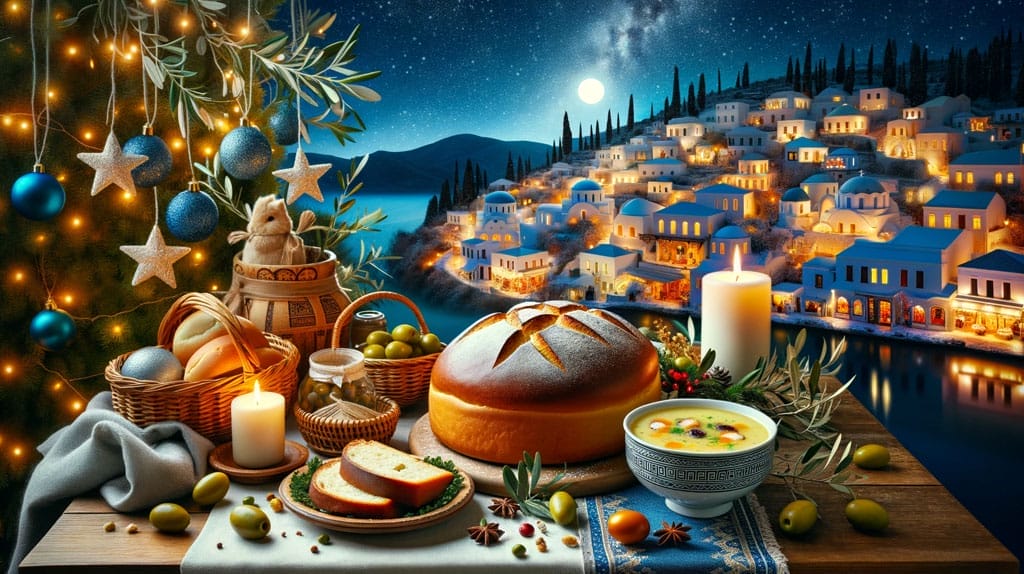
Quick Summary
- Greek Christmas traditions are steeped in history and bring communities together in festive spirit.
- From boat decorations to olive branches, Greek Christmas celebrations incorporate symbols of hope, peace, and prosperity.
- Indulging in traditional Greek treats, attending church services, and exchanging gifts are all part of the holiday season.
- Fireworks, parades, and wine tasting add to the merriment of Greek Christmas celebrations.
- Exploring similarities and differences with other European Christmas traditions can provide unique insights into holiday customs.
Christmas Boat Decoration: A Symbol of Hope
When you think of Christmas decorations, you may picture ornaments, lights, and wreaths. But in Greece, one unique Christmas tradition involves decorating boats. Known as “Karavaki,” these festive boats are a symbol of Greece’s maritime heritage and a way to bring hope for a safe and prosperous year ahead.
The boats are often small and are decorated with colorful lights, ornaments, and even small gifts. The tradition of boat decoration is especially popular in coastal cities and islands, where the sea is an integral part of the community’s identity.
The Karavaki serves as a reminder of the importance of the sea in Greek culture, as well as a symbol of hope for the future. It’s a tradition that brings joy and light to the holiday season, adding a unique touch to the festive celebrations.
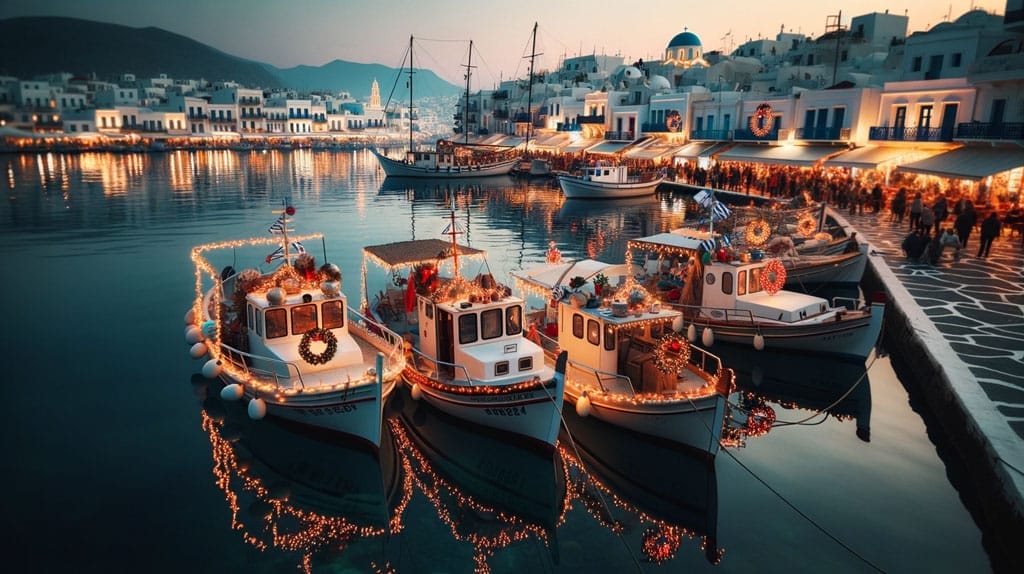
For Greeks, the Christmas season is a time to draw on the rich cultural heritage of their country. Through unique traditions like the Christmas boat decoration, they celebrate their history and look towards the future with hope and optimism.
“The Karavaki serves as a reminder of the importance of the sea in Greek culture, as well as a symbol of hope for the future.”
Vasilopita Cake Ceremony: A Sweet Start to the New Year
The Vasilopita cake ceremony is a cherished tradition among Greek Christmas traditions. It is a special cake baked with a hidden coin inside. The cake is cut on New Year’s Day, and the person who finds the coin in their slice is said to have good luck for the coming year. The Vasilopita cake is usually a sweet bread-like cake flavored with orange, cinnamon, and brandy.
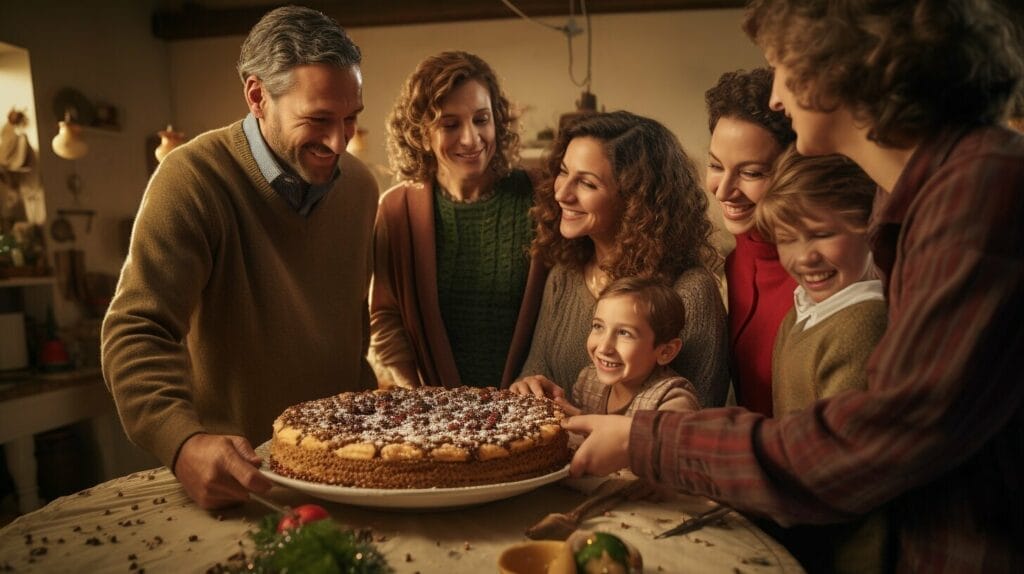
The ceremony itself is steeped in symbolism, with the cutting of the cake representing the opening of the year, and the coin symbolizing good fortune and prosperity. The cake is sliced in a specific order, with the first slice going to Jesus, the second slice for the Virgin Mary, and then to the head of the household, and so on. This tradition brings families and communities together to share in the joy of the new year.
The Vasilopita cake ceremony is a way to honor the new year and start it off on a sweet note. It is a beloved tradition that has been passed down through generations and continues to be cherished by Greeks around the world.
Kalanda Caroling Tradition: Spreading Joy through Melodic Tunes
One of the most beloved Greek Christmas traditions is the Kalanda caroling tradition. Kalanda is the Greek word for carols, and during the Christmas season, groups of children and adults gather to sing these traditional songs from house to house. The joyful melodies and cheerful lyrics of Kalanda carols bring people together, spreading the Christmas spirit and festive cheer.

The Kalanda caroling tradition has a long history in Greece, dating back to ancient times. In the past, carolers would go from town to town, singing songs to different gods and goddesses in exchange for food and wine. Today, the tradition is more focused on spreading joy and celebrating the birth of Christ.
Typically, the carolers are dressed in traditional Greek costumes, and they carry instruments such as guitars, mandolins, and accordions. Each group has a leader, who carries a wooden triangle that they use to keep the beat while singing. The group sings songs about the nativity, praising the birth of Jesus and wishing everyone a Merry Christmas.
It’s a heartwarming experience to receive a visit from Kalanda carolers during the holiday season. They bring with them a sense of community and belonging, reminding us of the true spirit of Christmas. If you ever find yourself in Greece during the holidays, be sure to listen out for the sweet sound of Kalanda carols and join in on the festive fun and merry making.
Feast of St. Nicholas
December 6th is an important day in Greece as it marks the Feast of St. Nicholas, the patron saint of sailors. This day is celebrated with special church services, honoring the saint’s life and legacy.
St. Nicholas was a 4th-century bishop known for his generosity and compassion towards others, particularly children. According to tradition, he would secretly leave gifts for those in need, inspiring the modern-day figure of Santa Claus.
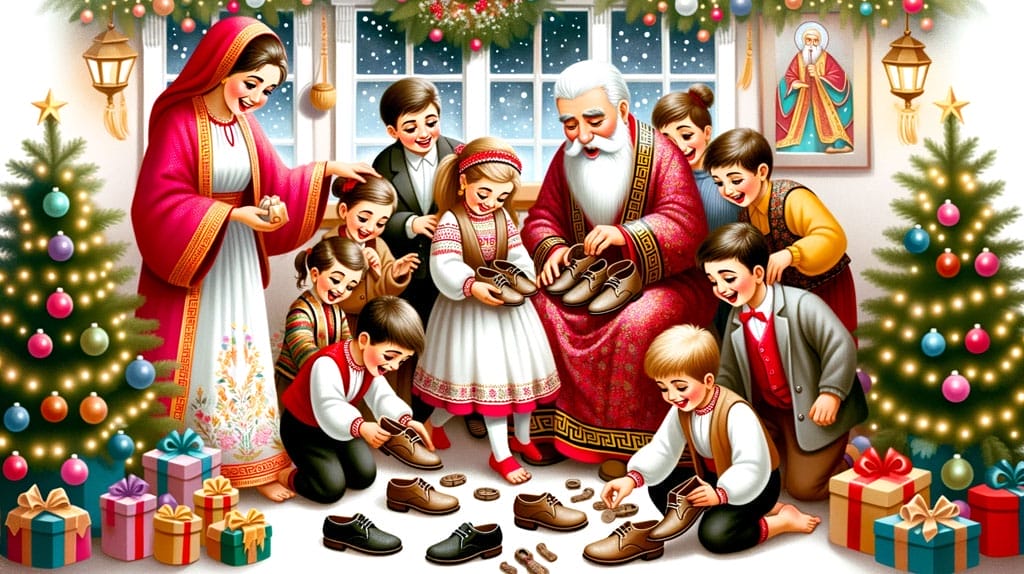
On the Feast of St. Nicholas, children in Greece receive small gifts in their shoes, left by the saint himself. It’s a joyful occasion that brings families and communities together, celebrating the spirit of generosity and kindness that St. Nicholas embodied.
The Feast of St. Nicholas is also a time for reflecting on the importance of sailors in Greek culture. The sea has always played a vital role in Greece, and the country has a deep connection to its maritime heritage.
Celebrating St. Nicholas, the patron saint of sailors, is a way to honor this heritage and pay tribute to those who risk their lives at sea.
Whether you’re attending a church service or sharing gifts with loved ones, the Feast of St. Nicholas is a cherished part of Greek Christmas traditions. It’s a time to come together as a community and celebrate the spirit of generosity, compassion, and hope that St. Nicholas represents.
Christopsomo Bread: A Symbolic Christmas Loaf
Among the many delightful traditions of Greek Christmas, one that is particularly beloved is the Christopsomo bread. This delicious and beautifully adorned bread is a symbol of the birth of Christ and is a staple at holiday gatherings.
The bread is made with various ingredients, including spices, nuts, and sometimes dried fruits. It is often decorated with a cross on top, symbolizing the birth of Christ.
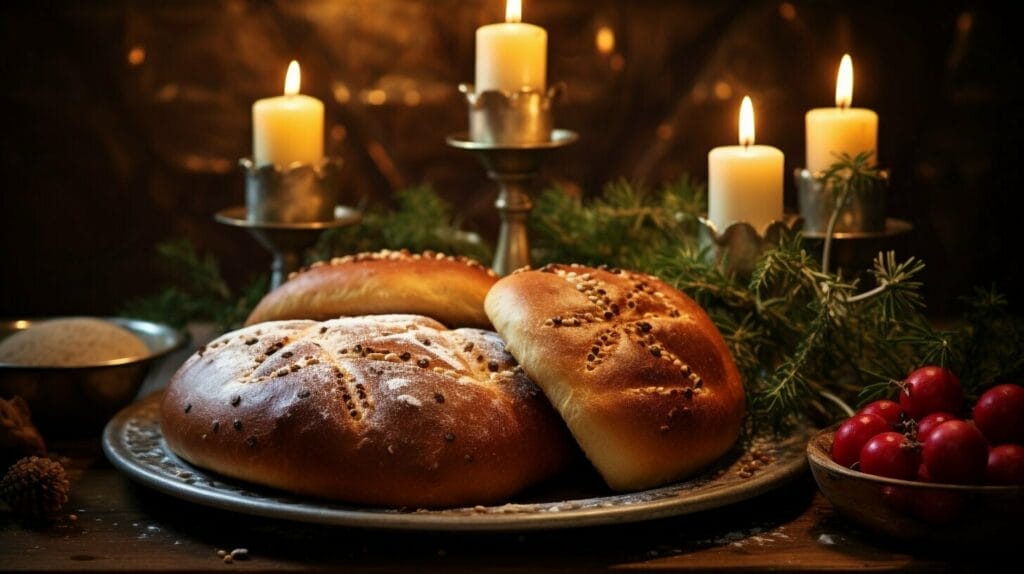
The Christopsomo bread holds special significance for Greeks, as it is a way to celebrate the spiritual and cultural aspects of the holiday season.
This traditional bread is usually baked on Christmas Eve and is shared with family and friends during the festive gatherings. It is believed that the bread brings good luck and prosperity to those who partake in it.
The Christopsomo bread is a beautiful and delicious representation of Greek Christmas traditions. It adds a special touch to the festive table, and its significance reminds Greeks of the true meaning of the holiday season.
Epiphany
Epiphany, celebrated on January 6th, marks the baptism of Jesus in Greek Orthodox tradition. This important day in Greek Christmas traditions is marked with a special church service, where the priest blesses the waters by throwing a cross into the sea or a nearby body of water.
The ceremony attracts large crowds, with many people eagerly waiting to see who will retrieve the cross. Brave men dive into the cold water to retrieve the cross, bringing good luck for the year to the one who successfully finds it.

This tradition is a beautiful reminder of the spiritual essence of Greek Christmas, emphasizing the importance of faith and community.
Mischievous Kallikantzaroi Goblins
Get ready for some spine-tingling tales of the kallikantzaroi, mischievous goblins said to roam the earth during the Christmas season. According to Greek folklore, these creatures emerge from the depths of the earth on Christmas Eve and continue to cause trouble until the Feast of the Epiphany on January 6th.
The kallikantzaroi are said to be attracted to the warmth of human homes and will stop at nothing to enter. To ward off these pesky creatures, Greeks have come up with a few creative tricks. One is to leave a colander on the doorstep, as the goblins will be so busy counting the holes they will forget why they came in the first place! Another is to hang a pomegranate on the door, as the bright red fruit symbolizes good luck and serves as a protective charm against the kallikantzaroi.

Despite their mischievous ways, the kallikantzaroi can also bring some entertainment to the Christmas season. Greek children love hearing stories about these creatures and often leave out sweets or treats in hopes of appeasing them. So, keep your eyes peeled for any signs of the kallikantzaroi this Christmas season and enjoy the tales that come with them!
Celebrating the New Year is a time-honored tradition in Greece, and there are many customs and rituals associated with this holiday season. As the year draws to a close, families gather to welcome the coming year with joy and hope. Here are some traditions you can expect to see during a Greek New Year’s Eve celebration:
Lighting Candles
Lighting candles is a common New Year’s Eve tradition in Greece. Many families light a candle at midnight, symbolizing the light of hope for the coming year. The candle is then left burning throughout the night to ward off evil spirits and bring good luck.
Setting the Yule Log on Fire
Another customary New Year’s Eve practice is setting the yule log on fire. The burning log represents the end of the old year and the beginning of a new one. As the log burns, Greeks welcome the coming year with warmth and light.
Holiday Olive Wreaths
Olive wreaths are a symbol of peace and prosperity in Greek culture. During the Christmas season, many Greeks adorn their homes with olive branches and wreaths. On New Year’s Eve, some families wear holiday olive wreaths, representing the hope for a peaceful and prosperous year ahead.
Counting Down to Midnight
As the clock strikes midnight, Greeks countdown to the New Year with joy and excitement. Fireworks light up the sky, and families exchange kisses and well wishes for the year ahead. Countdowns take place in town squares, homes, and other public places throughout Greece.

Avgolemono soup is a traditional Greek soup enjoyed on New Year’s Eve. It is made with chicken, rice, and lemon, and symbolizes the hope for a fruitful and abundant year ahead. Sharing a bowl of Avgolemono with loved ones is a cherished New Year’s Eve tradition in Greece.
By embracing these time-honored New Year’s Eve customs, Greeks welcome the coming year with open hearts and a spirit of hope. This is just one of the many Greek Christmas traditions that make the holiday season so unique and special.
Church Midnight Mass: Embracing the Spiritual Essence
Attending the midnight Mass on Christmas Eve is a must-have experience during the holiday season. As a part of Greek Christmas traditions, the Church midnight Mass is a solemn and sacred service that brings families together to celebrate the birth of Christ, through prayers and hymns.
The atmosphere is truly magical, with the church adorned with twinkling lights and fragrant incense. You’ll feel the enchanting energy of the holy space, as you participate in the age-old tradition with your loved ones.

It is an event that is not to be missed, whether you are religious or not. The church midnight Mass is an opportunity to connect with your community and experience the spiritual essence of Greek Christmas traditions. So, dress warmly, gather your loved ones, and immerse yourself in the joy and solemnity of this sacred service.
Traditional Christmas Sweets: Delighting the Palate
One of the most delicious aspects of Greek Christmas traditions is the array of sweet treats that are enjoyed during the holiday season. From honey-dipped cookies known as melomakarona to almond cookies covered in powdered sugar called kourabiedes, these delights are a must-have for any festive gathering.
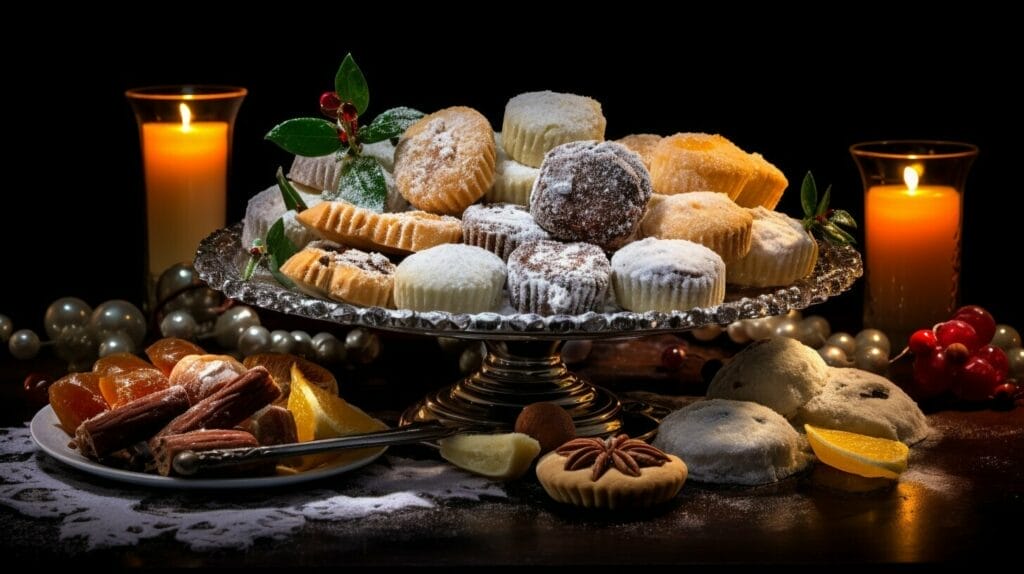
The preparation of these traditional sweet treats is often a family affair, with generations passing down secret recipes and techniques. The use of honey, nuts, and spices in these desserts is not only delicious but also symbolic, as they represent the bounty of the earth and the blessings of the season.
As you indulge in these delectable treats, you’ll be transported to a world of warmth and joy, surrounded by loved ones and the magic of the season. Whether enjoyed with a cup of hot tea or as a sweet finale to a festive meal, Greek Christmas sweets are sure to delight your palate.
Gift Giving Tradition: Sharing the Spirit of Generosity
One of the most heartwarming aspects of Greek Christmas traditions is the act of gift giving. Just like in many cultures, this is a time to show your love and appreciation for the important people in your life. Whether it’s a thoughtful gift or a small token of appreciation, the spirit of generosity is at the heart of this tradition.
As part of the Greek Christmas traditions, exchanging gifts is common on either Christmas Eve or New Year’s Day. It’s a time when families and friends come together to share in the joy of the season. There are many different types of gifts that you can give, from homemade treats to small trinkets and beyond.

One popular gift for the Christmas season is the ‘kourabiedes’, a delicious Greek almond cookie covered in powdered sugar. These sweet treats are a must-have at any Greek holiday gathering, and they also make a great gift for your loved ones.
Another popular gift is the ‘karavaki’, a small decorative boat. These boats are often given as a symbol of hope for a safe and prosperous year ahead and are a nod to Greece’s maritime heritage. Whatever you choose to give, remember that the act of giving is what truly matters. The joy of seeing someone’s face light up in delight is what makes this tradition so special.
“The act of giving is what truly matters. The joy of seeing someone’s face light up in delight is what makes this tradition so special.”
Christmas Lamb Roast: A Feast Fit for a King
When it comes to Greek Christmas traditions, one cannot miss the mouthwatering feast featuring a roasted lamb. This succulent meat is the centerpiece of the festive table, and it symbolizes the sacrificial lamb of Christ.
In Greece, the Christmas lamb roast is traditionally cooked in a wood-fired oven, which gives it a unique and smoky flavor. The meat is typically seasoned with garlic, rosemary, and oregano, and cooked slowly for several hours until it reaches the perfect level of tenderness.
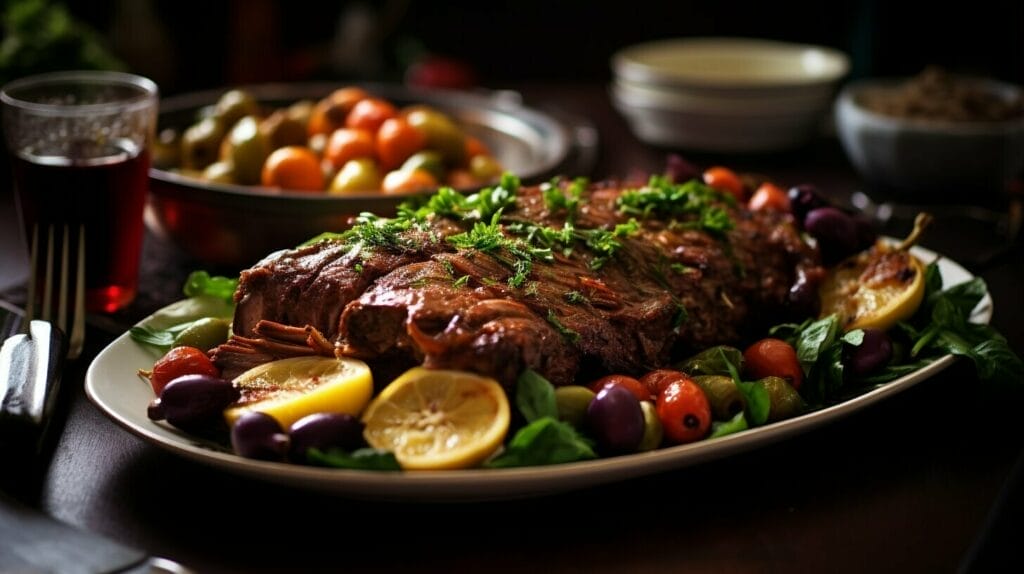
Sharing a lamb roast with your loved ones is a special experience, as it brings the family together and creates a warm and joyful ambiance. The Greek Christmas lamb roast is not just a meal, it is a festive tradition that signifies the abundance of blessings and the spirit of generosity that characterizes the holiday season.
Make your own roasted lamb this Christmas and impress your family and friends with this delicious dish. You can find many recipes online that will guide you through the cooking process step by step.
Enjoy the succulent flavors of a Greek Christmas lamb roast, and embrace the warmth and joy of the holiday season.
Decorative Christmas Ships: Nautical Delights
When it comes to Greek Christmas traditions, it’s not just about the decorations for your tree or home. It’s also about the festive ships! Greeks celebrate the holiday season with decorative ships displayed in their homes, which are often made of wood and adorned with festive ornaments to spruce up any room.

These miniature ships add a touch of nautical charm to your holiday décor, and are a reminder of Greece’s maritime heritage. They are often displayed alongside the Christmas boat decoration and olive branches, creating a visually stunning representation of the hope and blessings of the season.
Whether you’re a lover of all things nautical or simply want to add a unique touch to your holiday décor, the decorative Christmas ships are a must-have for any Greek Christmas celebration.
Greek Christmas Table Setting
One of the most important aspects of Greek Christmas traditions is creating a warm and inviting atmosphere for celebratory meals with friends and family. The holiday table setting is a crucial element of this ambiance. Take inspiration from the beauty of Greece by incorporating fresh olive branches, candles, and traditional ornaments into your table decor.
The centerpiece of your table can be a decorative bowl filled with fresh pomegranates, a symbol of good luck and protection, or a beautiful Christopsomo bread adorned with a simple olive branch. You can also add a touch of sparkle with gold or silver accents woven throughout the table setting.
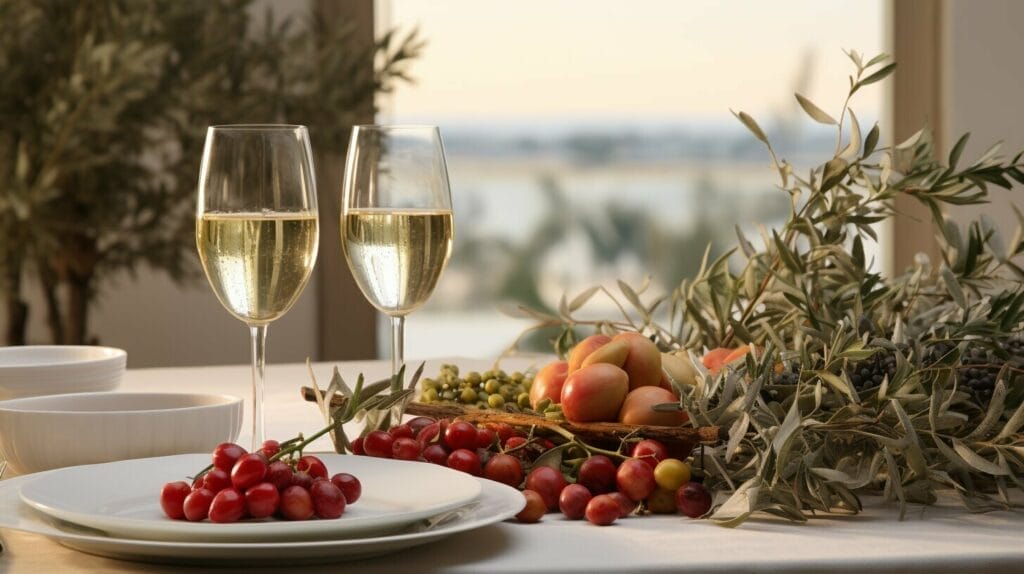
Traditional plates and cutlery can add a touch of authenticity to your table, and festive cloth napkins can be tied with a piece of twine or ribbon to add a charming touch. Make sure to leave plenty of space for the delicious spread of Greek Christmas sweets and savory dishes that will be served.
And don’t forget about the lighting! Candles can add warmth and a soft glow to your table, while string lights can add a whimsical touch. Consider creating a cozy atmosphere with soft lighting that enhances the festive spirit of the holiday season.
By taking care in creating a festive holiday table setting, you can enhance the joyful ambiance of your Greek Christmas celebration. Your guests will feel both welcome and enchanted, savoring not only the delicious food but also the beauty and warmth of the atmosphere.
Frankincense
Frankincense, a fragrant resin, holds special significance during Greek Christmas traditions. It is often burned as incense during church services and at home, creating a soothing and aromatic ambiance that adds to the spiritual essence of the holiday season.
Burning frankincense is believed to have a purifying effect and is often used as a symbol of prayer and devotion. The fragrant smoke is said to carry prayers and blessings up to the heavens, bringing peace and enlightenment to those who inhale it.
“The fragrant smoke is said to carry prayers and blessings up to the heavens, bringing peace and enlightenment to those who inhale it.”
This tradition dates back thousands of years and is still practiced today in Greece and many other countries. The sweet scent of burning frankincense is an integral part of the sensory experience of Greek Christmas celebrations, adding to the festive and spiritual atmosphere of the holiday season.
Christmas Olive Branches: Symbol of Peace and Prosperity
Nothing quite symbolizes the spirit of Greek Christmas traditions like the olive branch. This iconic symbol of peace and prosperity has been revered by Greeks since ancient times, and during the holiday season, it takes on an even greater significance.
It is common to see olive branches used to decorate homes, churches, and even Christmas trees. The branches are often woven into wreaths or used as table centerpieces, infusing the holiday atmosphere with a sense of tranquility and hope.
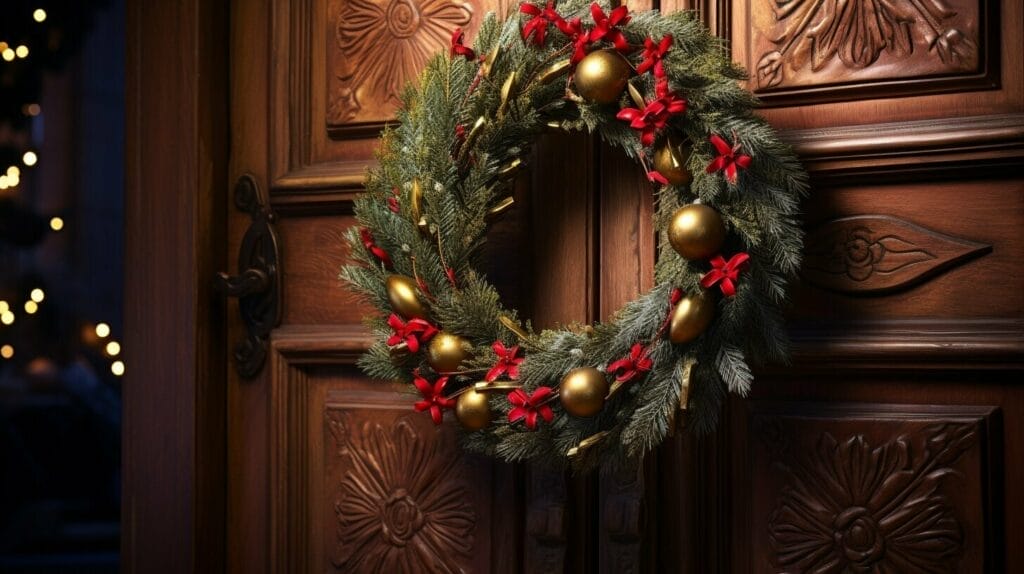
In addition to their visual appeal, olive branches also carry a potent spiritual meaning. According to Greek legend, the goddess Athena gifted the olive tree to the city of Athens, bestowing upon it the power of peace and fertility. This gift is said to have enabled Athens to prosper and advance in many ways.
Today, the olive branch continues to be a symbol of hope, prosperity, and peace for Greeks around the world. Incorporating this iconic symbol into your holiday decor is a meaningful way to connect with the rich cultural heritage of Greece.
Christmas Caroling
One of the most beloved Greek Christmas traditions is listening to choirs perform traditional carols in town squares. The sound of harmonious voices singing joyful tunes creates a festive atmosphere that truly embodies the spirit of Christmas. You can’t help but feel uplifted and full of joy when you listen to these beautiful performances.
The choirs often dress in traditional costumes, adding to the visual spectacle of the performance. As you listen to the music, you’ll notice that many of the songs have a deep spiritual significance, conveying the true meaning of Christmas.
Watching and listening to these performances is a cherished tradition that has been passed down through generations of Greeks. It is a wonderful way to bring together local communities and celebrate the holiday season in true Greek style.
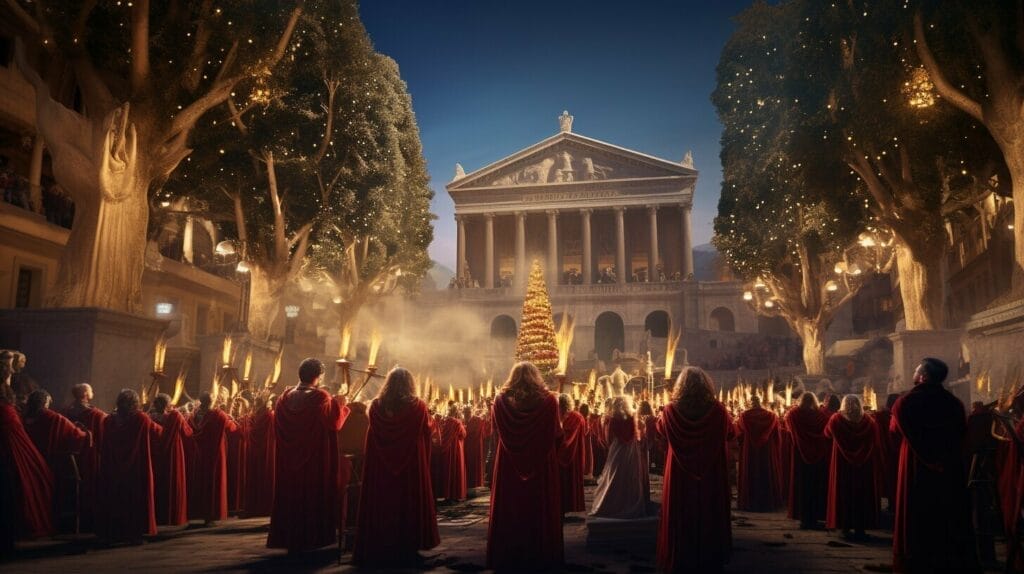
Fireworks are a staple of Greek Christmas traditions, adding sparkles to the already festive season. The colorful displays light up the night sky, bringing joy and excitement to the crowds that gather to watch them. If you’re in Greece during the Christmas holiday season, be sure to catch a fireworks show in your local community or attend one of the many organized events.
Christmas Fireworks
Watching fireworks is a cherished tradition for many Greeks, and it’s easy to see why. The dazzling explosions and bursts of colors create a magical ambiance, making the festive season come alive with wonder and cheer. Whether you’re enjoying the fireworks with friends and family or admiring them from a distance, these sparkling spectacles are sure to impress.

When it comes to Greek Christmas traditions, one of the most exciting and vibrant events is the festive village parade. These parades bring local communities together, showcasing their culture and customs with joyful celebrations in the streets. From traditional costumes and lively music to colorful decorations, the parades are a visual display of the rich heritage of Greece.
As you join in the merriment of these parades, you’ll see locals dressed in traditional attire, often with unique regional variations. Musicians and dancers perform lively tunes, while others carry festive decorations or light lanterns. You’ll be immersed in the sounds, scents, and sights of a truly authentic Greek Christmas experience.
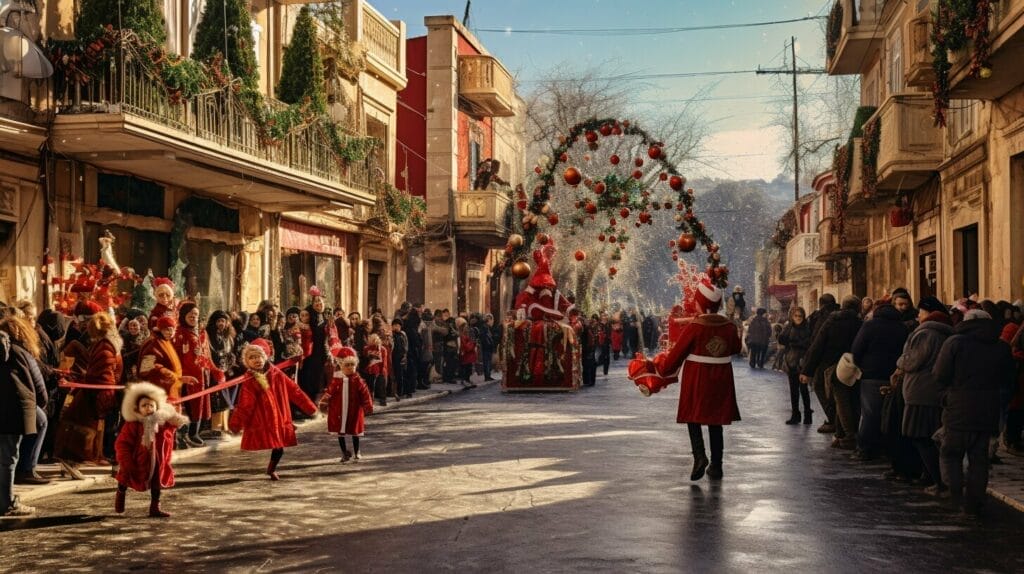
One of the highlights of these parades is the sense of community spirit that permeates the atmosphere. Everyone is welcome, from the youngest to the oldest, creating a joyful atmosphere that’s perfect for families and friends to come together during the holiday season.
So if you’re looking to experience the heart and soul of Greek Christmas traditions, be sure to seek out one of the many festive village parades taking place in towns and villages throughout Greece. It’s a celebration you won’t soon forget!
Holiday Wine Tasting: Cheers to the Season
One of the most enjoyable aspects of Greek Christmas traditions is the holiday wine tasting. Gather with friends and family to toast to the season with a glass of local wine. Greece has a rich winemaking history, with varieties from all regions of the country, including Santorini, Crete, and the Peloponnese. Take the opportunity to savor the unique flavors and aromas of Greek wine.
During the holiday season, it’s common to pair wine with festive foods, such as roasted lamb, fruits, and traditional sweets. The right pairing can bring out the best in both the wine and the food. Experiment with different combinations to find your favorite match.
Wine tasting during Greek Christmas celebrations becomes a social activity, bringing people together to share in the merriment of the season. Enjoying a glass of wine with loved ones is a cherished tradition, creating memories that last a lifetime.

As you celebrate the season with traditional Greek Christmas customs, make sure to experience the local wines. Indulge in the flavors and aromas, and toast to good health and happiness for the coming year.
European Christmas Traditions: Exploring Similarities and Differences
If you’re interested in Greek Christmas traditions, chances are you’ll find other European countries’ holiday customs just as fascinating. European Christmas traditions are unique and diverse, each with their own significance and symbolism. Let’s take a closer look at some similarities and differences between Greek Christmas traditions and other European holiday customs.
Similarities
One tradition that is common among many European countries, including Greece, is gift-giving. The act of giving presents to loved ones is a way to express gratitude and love, and it’s a prominent feature of the holiday season across Europe.
Food is also a significant aspect of Christmas celebrations in many European countries, and Greece is no exception. Sweet treats like melomakarona and kourabiedes are a staple during Greek Christmas, while other countries enjoy their own traditional holiday fare, such as Germany’s stollen or Italy’s panettone.
Additionally, many other European countries share the Greek tradition of attending church services during the holiday season. Midnight Mass is a special occasion for many families, and the spiritual essence of the holiday season is embraced in a variety of different ways across Europe.
Differences
While many European countries share similar traditions, each country has its own unique customs as well. For example, in Italy, the holiday season is marked by the Feast of the Seven Fishes, a Christmas Eve tradition that involves a multi-course seafood dinner.
In Spain, nativity scenes or “belenes” are a common sight during the Christmas season, while in Germany, Christmas markets are a popular way to celebrate the holiday season.
Lastly, the Nordic countries have their own unique Christmas traditions, such as the Norwegian practice of hiding brooms on Christmas Eve to ward off evil spirits or the Swedish custom of celebrating St. Lucia’s Day on December 13th.
In conclusion, European Christmas traditions are diverse and fascinating. While there are similarities among many countries, each nation has its own unique customs that make the holiday season special. Whether you’re celebrating Greek Christmas or exploring other European traditions, the spirit of the season is felt throughout the continent.
FAQ
What are some unique Greek Christmas traditions?
Greek Christmas traditions include the decoration of small boats, the Vasilopita cake ceremony, caroling with kalanda, and the observance of the Feast of St. Nicholas, among others.
What is the significance of the Christmas boat decoration?
The Christmas boat decoration symbolizes Greece’s maritime heritage and represents hope for a safe and prosperous year ahead.
What is the Vasilopita cake ceremony?
The Vasilopita cake ceremony involves baking a special cake with a hidden coin inside. The cake is cut on New Year’s Day, and the person who finds the coin in their slice is believed to have good luck for the year.
What is kalanda caroling?
Kalanda caroling is the Greek tradition of singing carols from house to house during the Christmas season, spreading joy and festive spirit.
How is the Feast of St. Nicholas celebrated in Greece?
The Feast of St. Nicholas, celebrated on December 6th, involves special church services, festivities, and children receiving small gifts in their shoes in honor of St. Nicholas’ generosity.
What is Christopsomo bread?
Christopsomo bread is a traditional Greek Christmas loaf made with spices, nuts, and sometimes dried fruits. It is often decorated with a cross on top, symbolizing the birth of Christ.
What is the Epiphany and Cross Dive tradition?
Epiphany, celebrated on January 6th, involves priests blessing the waters by throwing a cross into the sea or a nearby body of water. Men then dive into the cold water to retrieve the cross, bringing good luck for the year.
What are Kallikantzaroi goblins?
Kallikantzaroi are mischievous goblins in Greek folklore believed to cause trouble during the Christmas period. To ward them off, Greeks tell stories and hang pomegranates on their doors as a symbol of protection.
What are some New Year’s Eve customs in Greece?
New Year’s Eve customs in Greece include lighting candles, setting the yule log on fire, wearing holiday olive wreaths, and enjoying a special soup called Avgolemono made with chicken, rice, and lemon.
How is the Church Midnight Mass celebrated in Greece?
The Church Midnight Mass on Christmas Eve is an important part of Greek Christmas traditions. Families gather at the local church to participate in the solemn yet joyous service, celebrating the birth of Christ with prayers and hymns.
What are some traditional Greek Christmas sweets?
Traditional Greek Christmas sweets include melomakarona (honey-dipped cookies) and kourabiedes (almond cookies covered in powdered sugar), among others.
Is gift giving a part of Greek Christmas traditions?
Yes, Greeks exchange gifts during the Christmas season as a way of sharing the spirit of generosity. Presents are often exchanged on either Christmas Eve or New Year’s Day.
What is the significance of a Christmas lamb roast in Greece?
A Christmas lamb roast is a symbol of the sacrificial lamb of Christ. It is often the centerpiece of a festive feast and is cooked slowly to develop delicious flavors.
Are decorative Christmas ships a part of Greek Christmas traditions?
Yes, alongside the Christmas boat decoration, Greeks also celebrate the holiday season with decorative ships displayed in their homes. These miniature ships serve as a reminder of Greece’s maritime heritage.
How do Greeks create a festive ambiance with holiday table settings?
Greeks decorate their holiday tables with olive branches, candles, and traditional ornaments, creating a warm and inviting atmosphere for celebratory meals.
What is the burning of frankincense during Greek Christmas traditions?
Frankincense, a fragrant resin, is burned as incense during church services and at home, creating a soothing and aromatic ambiance that enhances the spiritual essence of the holiday season.
How are Christmas olive branches used in Greek Christmas traditions?
Olive branches are used to decorate homes, churches, and Christmas trees during the Christmas season, symbolizing peace and prosperity.
Are there choirs performing in Greek town squares during Christmas?
Yes, choirs perform traditional carols in Greek town squares during the Christmas season, bringing a sense of community and joy to the festivities.
Do Greeks have holiday fireworks displays during Christmas?
Yes, colorful fireworks displays are common during Greek Christmas celebrations, adding an extra touch of magic and excitement to the festive season.
Are there festive village parades in Greece during Christmas?
Yes, many Greek villages hold festive parades during the Christmas season, featuring locals dressed in traditional costumes, musicians playing joyful tunes, and vibrant street decorations.
Is holiday wine tasting a part of Greek Christmas traditions?
Yes, Greeks enjoy local wines during the holiday season, gathering with family and friends to savor the unique flavors and enhance the festive merriment.
How do Greek Christmas traditions compare to other European countries?
Greek Christmas traditions have their own unique charm, but it can be interesting to explore similarities and differences with other European countries’ festive customs and traditions.




